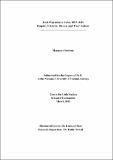| dc.contributor.advisor | Powell, Kathy | |
| dc.contributor.author | Brehony, Margaret | |
| dc.date.accessioned | 2013-01-21T14:42:17Z | |
| dc.date.issued | 2012-03-16 | |
| dc.identifier.uri | http://hdl.handle.net/10379/3181 | |
| dc.description.abstract | This interdisciplinary thesis examines and critically analyses previously unexplored materials relating to Irish transient labour in Cuba from 1835-1845. Sociological theory and historical analysis are applied to archival accounts of Irish railroad workers to examine this episode of labour migration from a multi-dimensional perspective that pays close attention to processes of class, race, legal status and to a lesser extent gender. This study treats the archive not as a 'repository of the facts' but as a 'complexly constituted' discourse of slavery and free labour, produced in the formation of colonial processes of class, ethnicity and migration. Irish contract labourers became part of a modernising project to replace slavery with 'free' labour with the additional aim of 'whitening' the population. Postcolonial theory is applied to the historiography of the railroad workers and rather than ask 'how the Irish became white', this study examines the discourse and strategies of Cuban colonial elites in which Irish, workers, were seen as 'whitening' agents in the formation of a separate Cuban identity in opposition to the perceived 'africanisation' of Cuban culture. I also turn the postcolonial gaze on Irish migration history by examining pre-famine mobile labour, and its repertoire of resistance to coercive labour relations as part of 'a counter-culture of modernity' which began with an Irish agrarian underground.
The position of the railroad workers raises in a complex way other issues thrown up by the extraordinary historical context of transatlantic migration in which they operate including an established Cuban-Irish slaveholding elite and forced migrants from Africa and indentured labour from the Canary Islands. Irish migration to Cuba is analysed against the contentious politics of a deepening dependence on slavery in an era of abolition, Cuban nationalist 'whitening' strategies, and questions of solidarities and resistance in the overlapping processes of class and race. | en_US |
| dc.rights | Attribution-NonCommercial-NoDerivs 3.0 Ireland | |
| dc.rights.uri | https://creativecommons.org/licenses/by-nc-nd/3.0/ie/ | |
| dc.subject | Cuba | en_US |
| dc.subject | Irish migration | en_US |
| dc.subject | Ethnicity | en_US |
| dc.subject | White colonisation | en_US |
| dc.subject | Contract labour | en_US |
| dc.subject | Slavery | en_US |
| dc.subject | Resistance | en_US |
| dc.title | Irish Migration to Cuba, 1835-1845: Empire, Ethnicity, Slavery and 'Free' Labour | en_US |
| dc.type | Thesis | en_US |
| dc.contributor.funder | Irish Research Council for the Humanities and Social Sciences | en_US |
| dc.description.embargo | 2016-09-21 | |
| dc.local.final | Yes | en_US |
| nui.item.downloads | 15038 | |


